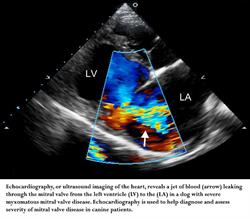Fund made possible by Bruce Wiltsie and William Davenport
[January 8, 2015; Philadelphia, PA] – A $450,000 gift from Bruce Wiltsie and William Davenport will support Penn Vet research in the treatment of canine Mitral Valve Disease (MVD). Named in honor of their beloved dog, Barth, who passed away from MVD, the “Barth” Memorial Fund for Mitral Valve Disease Research will enable experts at Penn Vet to investigate new medications to stop or reverse the process of the disease. This work also has important implications for non-surgical treatment of MVD in people.
 “We are incredibly grateful to Bruce and Bill for their generosity,” said Dr. Mark Oyama, Professor of Cardiology at Penn Vet and a leading authority on MVD. “Having suffered the loss of Barth to this devastating disease, they understand firsthand how important this research is to both dogs and humans.”
“We are incredibly grateful to Bruce and Bill for their generosity,” said Dr. Mark Oyama, Professor of Cardiology at Penn Vet and a leading authority on MVD. “Having suffered the loss of Barth to this devastating disease, they understand firsthand how important this research is to both dogs and humans.”
MVD, the most common heart disease in dogs, affects as many as 70% of dogs over 10 years of age. In dogs with severe MVD, the mitral valve leak can lead to congestive heart failure. Currently, there are no available therapies to slow or reverse the underlying disease process.
Dr. Oyama and his colleagues have found that many of the pathological features of serotonin-mediated valve disease in humans are strikingly similar to those found in dogs with MVD, in that:
- Serotonin activates degenerative changes within the dog mitral valve
- Drugs that block serotonin receptors reduce this response
- Dog breeds that are predisposed to MVD have increased serotonin in their blood stream and heart tissues
With the establishment of the “Barth” Memorial Fund for Mitral Valve Disease Research, Dr. Oyama aims to develop a serotonin-blocking drug to stop or reverse the disease before congestive heart failure occurs. Once a new drug is developed, or the best existing alternative is identified, a clinical trial will follow, involving several hundred dogs worldwide with naturally occurring early MVD.
About Penn Vet
Penn Vet is a global leader in veterinary medicine education, research, and clinical care. Founded in 1884, Penn Vet is the only veterinary school developed in association with a medical school. The school is a proud member of the One Health Initiative, linking human, animal, and environmental health.
Penn Vet serves a diverse population of animals at its two campuses, which include extensive diagnostic and research laboratories. Ryan Hospital in Philadelphia provides care for dogs, cats, and other domestic/companion animals, handling more than 31,000 patient visits a year. New Bolton Center, Penn Vet’s large-animal hospital on nearly 700 acres in rural Kennett Square, PA, cares for horses and livestock/farm animals. The hospital handles more than 4,000 patient visits a year, while the Field Service treats nearly 36,000 patients at local farms. In addition, New Bolton Center’s campus includes a swine center, working dairy, and poultry unit that provide valuable research for the agriculture industry.
For more information, visit www.vet.upenn.edu.